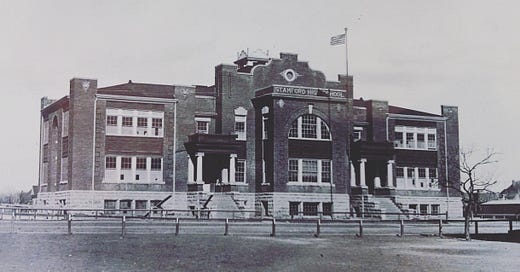Essays From West of 98: Needing to Want to be From Here
High school graduation closes a chapter of life. How to avoid that becoming permanent.
We are wrapping up high school graduation season in America. Across the land, thousands of students will say goodbye to 12 years of education and move into their next phase of life.
In the past, I have written that in small towns, the “new year” cycle revolves around a school calendar more than the Gregorian calendar. Sure, the year changes on January 1, but not much else does. A community experiences real change as a school year concludes and another one commences. New faces move to town. Old faces move away. New friendships and relationships are built, while others change forever. Classmates move away, friends transition from one school building to another, and teachers retire. For some high school graduates, their time as a resident of a community comes to an end. For some like myself, it was only a temporary sojourn through education before I returned, but for others, it is permanent.
My friend Seth Wieck is a talented author of prose and poetry. He hails from Umbarger but lives in the Umbarger suburb of Amarillo. Recently, he penned an open letter to the newly-elected mayor of Amarillo. It is kind and thoughtful, the sort of thing written by a person who truly cares for a place and its leaders. I am the mayor of Stamford, not Amarillo, but Seth’s words stirred my own heart as if they were addressed only to me. In his letter, Seth recounted the desire of Caesar Augustus to create a mythology to inspire and unify the Roman people. This ultimately led to the poet Virgil responding to the call and penning “The Aenid.” Seth wrote this and I have been thinking about it ever since:
“But he also understood the Romans needed to want to be Romans. They needed to be proud of their history and where they came from. They also needed to have an idea about who they were as a people. What were the virtues that made them Roman? This wasn’t something that could be forced upon citizens. This needed to be given as a gift, something in which they could take pride, and something they found beautiful.”
Which brings me back to high school graduation. As our graduates step off into the future, do they want to be from here? Wherever “here” is for you, dear reader, are your high school graduates proud of where they come from? Are they proud of the virtues that are associated with their nativity to that place?
Over the decades, we have made it very hard for our young people to answer these questions in the affirmative. The winds of agricultural mechanization and general suburbanization have left fewer of us able to say we are “from” small places. The noxious “get big or get out” push in American agriculture policy ensured that fewer families had a farm to pass on. Other families intentionally chose not to pass on the legacy or they encouraged their children to seek a life apart from what was becoming an increasingly difficult business. Not every family in a town like Stamford was a farm family, but many families were and as the farms declined, so did the fortunes of the storekeepers, office workers, retailers, teachers, and many others whose livelihoods were indirectly tied to a strong farm economy, whether they realized it or not. As their children finished school, many of them started families elsewhere. Their own children had family roots “back home,” but it was never home to them. Their home was somewhere else altogether.
This is a two-week essay because I couldn’t remotely fit all my thoughts into my weekly word count. Next week: what does it mean to WANT to be from a place? Caesar Augustus and Virgil offer an insight that rural America desperately needs to consider.
📷: the original Stamford High School, 1905-1923
James Decker is the Mayor of Stamford, Texas and the creator of the West of 98 website and podcast. Contact James and subscribe to these essays at westof98.substack.com and subscribe to West of 98 wherever podcasts are found.




